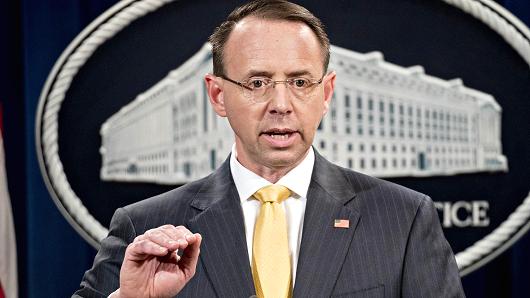
Andrew Harrer | Bloomberg | Getty Images
Rod Rosenstein, deputy attorney general, speaks during a news conference at the Department of Justice in Washington, D.C., U.S., on Friday, Feb. 16, 2018.
Russian actors had a complex system of search engine optimization, virtual private networks, and engineers dedicated to data analysis, graphics and IT, with the goal of sowing distrust in the American political system, according to a new indictment.
Thirteen Russian nationals and three Russian entities, indicted by a federal grand jury on Friday, are being accused of interfering with U.S. political processes across multiple campaigns, in violation of criminal laws. Twitter, PayPal, Google’s YouTube, and Facebook and subsidiary Instagram were among technology tools used by a Russian network of about 80 employees, the indictment said.
The role of social media in the election has been a specter for Silicon Valley, amid growing calls for more regulation around giants like Facebook. The set-up revealed by Friday’s indictment, not unlike a digital media start-up, sheds light on exactly what American technology companies have been up against.
The indictment adds more color to testimony made by technology executives over the past year. Representatives from Facebook, Twitter, and Google have told Congress that they were taking steps to remove fake accounts and counter propaganda, estimating that millions of people may have been exposed to the Russian content.
The groups created social media movements including United Muslims of America, Army of Jesus, Blacktivist, South United, and Heart of Texas, with a goal of undermining democracy as a whole, according to Deputy Attorney General Rod Rosenstein. They purchased advertisements and had hundreds of accounts in the names of both real and made-up Americans.
Using fake IDs and stolen identities, the group used PayPal accounts to pay for ads and promoted posts, and actually charged some U.S. merchants $25 to $50 for posts. PayPal told CNBC it is “intensely focused on combatting and preventing the illicit use” of its services, and that it worked with law enforcement on the Russia investigation.”
No Americans knowingly helped them, officials said. Twitter declined to comment on the indictment to CNBC, and Facebook and Google did not immediately respond to a request for comment.
“Defendants and their co-conspirators used false U.S. personas to organize and coordinate U.S. political rallies in support of then president-elect Trump, while simultaneously using other false U.S. personas to organize and coordinate U.S. political rallies protesting the results of the 2016 U.S. presidential election,” officials said on Friday.
— CNBC’s John Shinal, Ingrid Angulo and Kevin Breuninger contributed to this report.
 EU News Digest Latest News & Updates
EU News Digest Latest News & Updates



